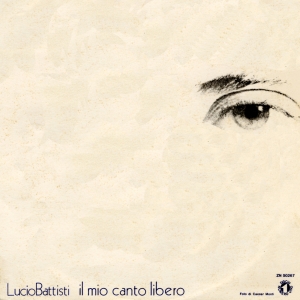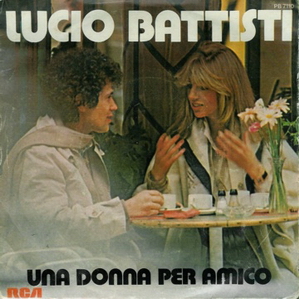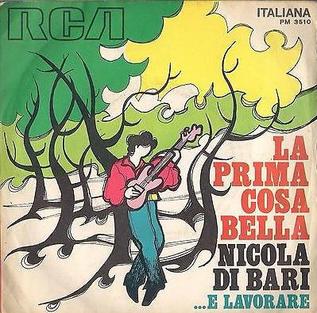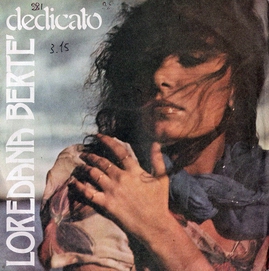
Adriano Pappalardo is an Italian singer, actor and television personality.

"Il mio canto libero" is a song written by Italian singer-songwriter Lucio Battisti and lyricist Mogol. The song was recorded by Battisti for the album of the same title, and released as a single in November 1972 for Mogol's recording label Numero Uno. The song was a commercial success in Italy, topping the Musica e dischi singles chart for nine consecutive weeks in 1973 and becoming the third best-selling single of the year. During the following years, it was covered by several artists, and it became a classic of Italian popular music. It was certified double platinum by the Federation of the Italian Music Industry in 2024, for domestic equivalent sales exceeding 200,000 units since 2009.

Lucio Battisti Vol. 2 is the second studio album by the Italian singer-songwriter Lucio Battisti. It was released in July 1970 by Dischi Ricordi.

I Camaleonti are an Italian pop group from Milan, mostly successful between the late 1960s and the early 1970s.
"E penso a te" is a song composed in 1970 by Lucio Battisti based on the lyrics by Mogol. Initially sung by Bruno Lauzi, it was subsequently re-recorded by numerous other artists. The most popular version remains the one which its author gave in 1972.

Bruno Mario Lavezzi is an Italian singer-songwriter, composer, record producer and guitarist.

"Una donna per amico" is a song composed by Lucio Battisti and Mogol, and performed by Lucio Battisti. It was released as a single in October 1978, with "Nessun dolore" as B-side. The single peaked at first place fourteen consecutive weeks on the Italian hit parade between November 1978 and February 1979. It was the second most sold single of the year in Italy, behind Bee Gees' "Stayin' Alive".

"La prima cosa bella" is a song composed by Nicola Di Bari and Mogol. The song ranked second at the twenth edition of the Sanremo Music Festival, with a double performance by Nicola Di Bari and Ricchi e Poveri.

Gaetano Cristiano Vincenzo Rossi, best known as Christian, is an Italian singer, mainly successful in the first half of the 1980s.

Dik Dik is an Italian beat/pop-rock band, named after the antelope Dik-dik, formed in the 1960s and still active. They were most popular in the late 1960s, when they released a string of hit singles with the contribution of renowned lyric-writer Mogol and songwriter Lucio Battisti, their greatest successes being "Sognando la California" and "Senza luce", respectively covers of "California Dreamin'" by the Mamas and Papas and "A Whiter Shade of Pale" by Procol Harum. While their early production is mostly inspired by the Beatles, in the 1970s they also experimented in other genres, including progressive rock. They went on hiatus in the 1980s but later returned to the scene, mostly in revival television shows and live performances.
Luigi Albertelli was an Italian songwriter and television author.
Cristina Barbieri, best known as Diana Est, is an Italian singer who retired in the mid-1980s.

"Perdono" is an Italian pop song written by Piero Soffici and Mogol and performed by Caterina Caselli.

Cristiano Minellono is an Italian songwriter and actor. He is also known as Popi Minellono.

"Il nostro concerto" is a 1960 Italian song composed by Umberto Bindi (music) and Giorgio Calabrese (lyrics). The song premiered at the Italian Music Festival in New York, in which was performed by Miranda Martino and placed third. It eventually was Bindi's major hit, whose version topped the Italian hit parade for several months.

"E la luna bussò" is an Italian reggae ballad written by Mario Lavezzi, Oscar Avogadro and Daniele Pace and performed by Loredana Bertè. One of Bertè's major hits, it stayed on the Italian Singles Chart for 29 weeks. It is regarded as the first reggae song produced in Italy.

"Dedicato" ("Dedicated") is an Italian R&B ballad written by Ivano Fossati and performed by Loredana Bertè. It was the first Bertè's single entering the top ten on the Italian hit parade.

"29 settembre" is a song composed in 1966 by Italian musician Lucio Battisti and lyricist Mogol and brought to success by Equipe 84 in March 1967. It topped the Italian charts for five weeks and led to Battisti's definitive affirmation as a composer. It is Notable for the innovative lyrics and sound heavily influenced by psychedelia, so much so that the song is nicknamed "Italy's Sergeant Pepper's" for the impact and the influence it had on the Italian music scene.

"Fiori rosa fiori di pesco" is a 1970 song composed by Lucio Battisti (music) and Mogol (lyrics), arranged by Detto Mariano and performed by Lucio Battisti.
"I' te vurria vasà" is a 1900 song composed by Vincenzo Russo, Eduardo Di Capua, and Alfredo Mazzucchi. A classic of the Canzone Napoletana, the song premiered at the Teatro Mercadante, performed by Amina Vargas.
















